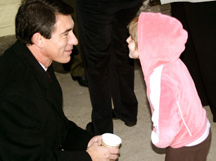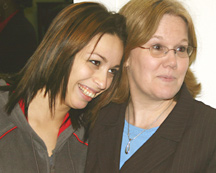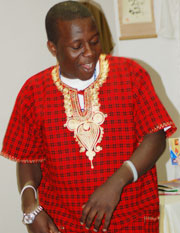BaptistWay Bible Series for March 18: Christian community is worth the effort
Posted: 3/08/07
BaptistWay Bible Series for March 18
Christian community is worth the effort
• Acts 2:41-47
Baptist Standard, Dallas
The Spirit of God made an indelible impression on the Jerusalem crowd—Jews gathered from all over the known world. Peter proved through the fulfillment of the prophecies of Joel (2:16-21) and David (vv. 25-30), through eyewitness accounts of the resurrection and the awesome marking of the coming of the Holy Spirit during Pentecost that Christ was the Son of God. Christ was raised and ascended but came again in the power of the Spirit to propel his message of redemption into the hinterlands of the world. Then Peter wraps up his sermon with a conclusion and an invitation.
The conclusion was this, “Therefore let all Israel be assured of this: God has made this Jesus, whom you crucified, both Lord and Christ” (v. 36). Grasping the truth of the message, the crowd was convicted and asked for guidance, “What shall we do?” Peter answers with the invitation: “Repent and be baptized, every one of you for the forgiveness of your sins. And you will receive the gift of the Holy Spirit. The promise is for you and your children and for all who are far off—for all whom the Lord our God will call” (vv. 38-39).
Peter preached the acceptance of Christ to receive the gift of God’s empowering Spirit and challenged the crowd to come into the spiritual kingdom through repentance, turning from their sins to Christ who would forgive them. The teachings of Christ and John the Baptist helped formulate his spontaneous message of repentance, forgiveness and baptism.
The power of the Spirit had worked in Peter’s heart and all who were gathered in the upper room and now Peter saw how God’s Spirit worked in the hearts of others. The remarkable response of some 3,000 (v. 41) who received his message was electrifying. Jesus had taught, preached, lived a perfect life and done miracles for some three years, yet only 120 or so who believed gathered in the upper room to wait for the promised coming of the Spirit.
The witness of the crucifixion, resurrection and ascension needed the work of the Spirit to turn hearts to God. With the gift of the Spirit, this small church immediately had multiplied 25 times. The beginning was impressive, albeit overwhelming as the small group of 120 saw what God could do through the preaching of one man, expounding from the overflow of his Spirit-filled heart.
The explosion of the Christian faith had begun and “those who accepted his message were baptized and about 3,000 were added to their number that day” (v. 41).
Facing new challenges (2:41)
The Holy Spirit created a unique work of God, “a chosen people, a royal priesthood, a holy nation, a people belonging to God that you may declare the praises of him who called you out of darkness into his wonderful light” (I Peter 2:9). Sudden and explosive growth left the small congregation of 120, who had experienced the close-knit fellowship that could meet in one room, with the responsibility of incorporating new believers into multiple, effective and informed congregations of missionaries.
Questions abounded: “What do we do?” “Tell me more about this Christ.” “Explain more about the life of this man Jesus, his miracles, his crucifixion, his sayings, his spirit, his lifestyle.” “What does baptism mean, and why should I do it?” “Explain the virgin birth.” “How do I know for certain I will go to heaven when I die?” And a thousand more issues of inquiry would come.
It would seem that in many ways, the blind were to lead the blind. The first believers still were learners, disciples hardly dry behind the ears, immature seekers of the promises of God. The teacher-learners surely provided their talent, skills and abilities to the apostles for arrangements, space, places to meet, learning aids, personal testimonies, seminars, classes and found with the help of the Holy Spirit, they were adequate to the needs of the moment. The key to creating practical and theological consistency and correct answers was in the hands of the chosen 12 apostles.
The description of the activities of these new converts is brief but revealing. Keep in mind there is no organization, no buildings, no budget, no denomination, no seminaries, no text books, no computers, no Bibles, nothing except a conversion experience to drive their energies, prophecy to bring credibility and the first-hand personal testimonies of his followers.
There is no indication in the passage that this small gathering was prepared for the response to Peter’s preaching but skipping over the detail, Luke indicates all is well in the new household of faith
Formulating the essentials of church (2:42-47)
Luke gives us a brief summary of life in the early church. More detail would be helpful, but what we have is enough to determine priorities, formulate structures, establish leadership and practice skills. Without most of the things the contemporary church considers necessary, they express their new faith in common ways and patterns that have overwhelming consequences. The stated functions are familiar and recognizable in most churches today. However, keep in mind that churches have a way of making things function without accomplishing great things for God.
Education, 2:42—First and foremost is the teaching of the apostles—those who had been with Jesus from the time he was baptized by John the Baptist, following him from Galilee to Jerusalem, to the crucifixion and the resurrection (1:21-22).
An apostle was one of divine authorization, commissioned by God, sent with authority and responsible to represent Christ. A disciple is a learner and the educational process is vital to insure the future effectiveness of this movement. We might say this was the first New Testament Sunday school or the first cell groups, without the earthly Jesus, meeting to understand their faith and responsibility. Such eager willingness to learn and obey resulted from empowerment and also a freshness of the new-birth experience.
The biblical illiteracy in today’s congregations is astounding. Too little time and effort is given to learning the Bible, its concepts, theology, philosophy, sociology, spirituality, uniqueness and truths. The whole of the Christian faith is up for grabs when we give so little time to the serious study of God’s word. Hosts of Christians consider 20 to 30 minutes on Sunday morning to be all the Bible study they need or want. Should one wonder why the church is chugging uphill, a finger of cause can be pointed here—at the lack of desire and the shallowness of knowledge. Where is the “devotion” today?
Fellowship, 2:42—The church is guided by its teaching track but runs on the wheels of fellowship. Fellowship is koinonia, meaning “fellow,” “participation,” “sharing,” “companion” and “friendship.” The group shares together a common experience of divine power or divine communion and also a communion with each other. Bonding takes place on both the divine and human level, each reciprocal to the other.
Work and leisure, communion and study, suffering and healing, joy and sorrow, victories and failures—all are shared together in as many ways as you can intellectually and emotionally comprehend. Man is a social being. A common fellowship formed around a common cause is a powerful tool of the Spirit, not unlike a log on the campfire that ignites and burns but goes out when laid aside alone.
Some common concerns permeate the challenge: the shallowness of sharing, the superficiality of friendship, the failure to identify and focus on the chosen goals of the kingdom, the selfishness of attitude, racial prejudices, social snobbishness and affluence, hypocrisy and falseness, pettiness and jealousies, pride and arrogance, and a few more we all can name.
Baptists are known for their inability to not get along, and the priesthood of the believer is exploited into a reason for breaking fellowship and hiding from spiritual and personality flaws. Rather than growing through the challenge, one may simply run and blame the issue on someone else.
How we treat each other is a sobering indication of the human soul with or without the empowerment of the Spirit. Singleness of mind, heart and soul is the product of a common Holy Spirit that breathes into man a filling of fullest proportion. The church becomes a reverse magnet to people on the outside based on perception of rejection, aloofness, self-righteousness and isolation.
Those in fellowship share in the experiences of worship through the breaking of bread and prayer. “Breaking of bread” probably refers to the Lord’s Supper which, at that time, was incorporated into the regular mealtime. Prayers are most effective when done in agreement, one with another.
Worship, 2:43—Not some, but “everyone” worshipped, “filled with awe,” a kind of anxious and fearful astonishment which characterizes the normal reaction when unexplainable wonders and miracles take place. Even after the wind, fire and tongues of Pentecost, there were events taking place through the apostles that shook the foundation of the soul as the Spirit of God made his presence felt.
Luke, again summarizing, leaves us to our own imagination providing us with the opportunity also to be in awe and exercise our faith. God can be so familiar that he becomes a lifeless idol, but, in his mystery, God reigns in the rarified atmosphere of our acknowledgment of his power and intervention into his own creation.
How often do you go to worship with an expectant anticipation of God’s presence and power? Awe is not something we do, but something we experience when God fills the temple of our soul.
Stewardship, 2:44-45—These verses add additional content to the meaning of fellowship. Fellowship is not just being together, but together, a sharing of goods, belongings and possessions “as every man had need.” Real estate was from time to time sold and the revenue was distributed to meet the physical needs of others in the fellowship.
Love for the larger community was strong enough that things held in common were given in the same way that God gave his Son and his Spirit. This part of God’s work cannot be ignored. I cannot imagine the number of lost people in hell today because of the hording of wealth by folk who claim the gift of rebirth. A missional people make giving the tithe an act of worship and obedience to a loving, giving God. God’s plan for the church includes sharing of personal possessions for the common good of the group.
Evangelism, 2:46—During this time, apparently through the witness of the believers, the preaching of the apostles and the conviction of the Spirit, others were being converted and added to the fellowship. The church did not turn inward to itself but continued the harvest, the penetration of their society with the gospel which bore fruit unto eternal life. Mass evangelism became personal evangelism, house to house, street by street.
The missional church thrives on the integration of Bible study, love for one another, worship and personal mission action—the major functions of its fellowship. However, more often than not, a congregation will focus on the first three while ignoring the last. I compare this to growing a perfect apple that rots on the tree, studying under a famous chef but never going into the kitchen, working at a fire station but never responding to a fire, getting a law degree but never going into the court room.
Churches know it all, but know nothing at all. Church programs today are designed for its members rather than the lost. Most churches use the precious time of their leaders to meet in committees to make decisions for someone else to carry out rather than focus on a fellowship filled with the Holy Spirit with a vision for evangelizing the lost and ministry to the hurting.
Committee meetings become the major work of the church and create a circular rotation of meaningless activity going nowhere and accomplishing scarce little. Hours of time are spent trying to move the church forward, but stalls out before the vital essentials of meeting human needs take place. That seems to be the Baptist way where church governance is the grandest expression of priesthood of the believers. The doctrine of the priesthood of the believer has been wed to a Washington democracy and the outcome is an icon of self-indulgence.
Biblical priesthood of the believer is not about individual voting rights but about individual responsibility before God to work out one’s own salvation with fear and trembling. Church is not all about me and what I like but rather about the Great Commission task—not just about study but work, and not just about giving but going. The contemporary church relishes the spectator role while relinquishing the spiritual responsibility for sake of convenience and comfort. The church is at ease in Zion.
The boomer generation, highly educated and mobile, has forced the current church of today to affirm personal participation in missions. The Cooperative Program was and is a mighty concept where churches join together in cooperative giving in order to be more effective in missions.
Unfortunately, as good as it has functioned, the mindset of the church has turned a great thing into an easy way out. Over the years, Christians have taken the “go” out of the mission mind-set. You cannot spell “GO” as “G-I-V-E,” “P-R-A-Y,” “W-O-R-S-H-I-P,” “E-D-U-C-A-T-E,” or “F-E-L-L-O-W-S-H-I-P.”
Discussion question
• How can genuine Christian community be developed in a world that emphasizes individualism?




